- Home
- Liz Braswell
Unbirthday Page 3
Unbirthday Read online
Page 3
Eventually they finished, tidied up the spilt chemicals, and left the plates to dry on a half dozen pressed and clean tea towels.
“I’m going to have a bit of vermouth and see if I can’t get Monique to make us a light lunch,” Vivian said with a heavy sigh, as if they had spent the last hour lifting weights. She crankily stuffed a piece of hair back into her bun and disappeared into the smoky rooms beyond.
They were supposed to wait an hour or so before handling the plates, but, always impulsive, Alice couldn’t help herself. She snuck one into her palm, knowing that if she was caught her aunt would lecture her about how Patience and Time were the lost twin sisters of the other muses, the extra ones no one ever talks about (as compared to the more showy ones like Terpsichore and Urania). Alice quickly made her way to the little solarium off the study, where the brightest light in the house would be.
The portrait she had grabbed was of Mrs. Pogysdunhow; she caught a glimpse in the photo of the settee from the staging area where she had taken it. Alice couldn’t remember if the sitter had been scowling or grinning with her two weirdly wide rows of tiny white teeth. Maybe it would be a masterpiece of artistic realism, or maybe just a horrible mockery that she would never be able to show the poor woman. The babies had been squirming. The exposure time had been approximately half a second—too slow to freeze the little tots; they would be blurry around the edges. But then weren’t babies a little blurry around the edges all the time anyway, with their drool and blankets and fuzzy hair?
Alice slipped into the bright sun of the solarium and anxiously tilted her hand around, trying to get a good look without glare.
Her eyes widened when she saw what she really held.
It wasn’t a portrait of Mrs. Pogysdunhow at all.
It was the Queen of Hearts.
Alice stared at the piece of glass in her hand, slick and thin and flat like a mirror, and tried to convince herself that she was wrong.
“’Tis a trick of the light,” she murmured aloud to make it true. Too scared to believe.
It was a smudge, a drip, a chemical defect. A distortion that was her fault somehow for not making sure the solutions were properly mixed and properly spread. There was a bubble in the fixative.
But when she held the negative up to the blue sky beyond the panes of window glass—also rectangular, like her photo plate—there was no mistaking it. The horrid, imp-like thing gawping in the middle of the picture had too massive a head, too vicious a grin even for Mrs. Pogysdunhow. And there were no babies.
Also she was wearing a crown.
A tiny, strange angular distortion of a crown—the sort of crown you’d give a playing card to wear if it had come alive. The Queen waved a fan (in the shape of a heart) at the viewer as if to say, Yes, it’s really me, don’t look away, you horrid girl. Her hands and feet were tiny. Too tiny for her barrel-like body.
Alice realized she hadn’t breathed in several seconds.
Wonderland!
Exactly from her dream.
But—
It was…real?
Alice wondered if this was what other girls felt like when they claimed they felt faint. The air in the tiny solarium was a little close. But instead of suffocating her, the warmth from the sun felt alive and rich on her hands, her skin soaking up its power with relish.
Yet even that, and everything else—the sky and brightness and the whole beautiful day—had become drab and unreal next to the strange grey-and-black image on the plate.
Alice peeped at it again almost from the corners of her eyes, afraid it would be gone, afraid it was a momentary hysterical delusion now replaced forever with a picture of a sadly all-too-non-fictive person. The Pogysdunhows of the world were too real to deny.
But no, the Queen was still there.
Alice laughed aloud and almost danced in the tiny confines of the solarium. Her smile and tossed golden hair put the glorious day outside to shame. She had Wonderland in her hand!
“Fancy that!” she breathed.
And yet…
Alice examined the picture more closely. There was hate in the negative-bright eyes of the Queen. Her smile was triumphant and cruel and looked like it could eat cities. True, the Queen of Hearts was malevolent and, in modern parlance, unbalanced in her constant sociopathic desire to take off everyone’s heads, but she had said and done everything with the callous antipathy of any unpleasant child playing with dolls. Not with any real feeling about the situation.
“Alice!”
She jumped at the shout. Her aunt was looking for her, swishing in and out of rooms with languid yet efficient movements, pant leg wiffling against pant leg.
“Yes, Aunt Vivian?”
She let herself back through the solarium door, the tiny brass doorknob reminding her of other things: tiny keys, tiny glass tables, tiny doors….
“Oh, getting a little sunlight, hmm?” her aunt asked appraisingly, looking at her over the tops of her glasses. “Probably quite healthy after the darkroom. Opens your pores. Here, these just came for you in the morning post.”
Alice took both the cards with surprise. Who had possibly known where she was, who was so formal and needed her? Which two people?
Breathlessly she cracked the first one open. In her excited state she wondered dizzily: Would it say EAT ME? Or DRINK ME? Or be some sort of invitation to a playing-card ball? Anything was possible!
But the handwriting was immediately—and sadly—recognizable as her sister’s.
My dearest Alice,
You did not let me finish speaking at breakfast in your haste to go running off to Our Aunt’s.
You will be delighted to hear, I am certain, that Mr. Headstrewth will be visiting with us during receiving hours. More than that, however, he will be bringing his good friend Mr. Richard A. Coney, whom I was also telling you about at breakfast.
Let me refresh your memory on the fine attributes of Mr. Coney in case you have forgotten: He is a very educated, intelligent young fellow destined for great things in our Party and the world in general. His hair is a brilliant platinum to your golden and I am certain you two will get along famously.
We will be receiving them at noon; a light tea will be served.
Ever yours,
Mathilda.
“No,” Alice said, her disappointment so severe it felt like gastric distress. Or perhaps that was merely the mention of Coney. “Absolutely not.”
“I don’t blame you,” her aunt said, having read the note over her shoulder. “Sounds ghastly and bourgeois.”
With something like feverish desperation Alice cracked open the other card. In the best of all possible worlds, there would be a tiny etching of a rabbit on it.
There was not.
Alice dear,
Please do not bother yourself in making up an excuse that we would never believe anyway.
Come or we shall never hear the end of it from your sister.
—Your Loving Mother.
Vivian let out a terribly unsophisticated bark of laughter. “She’s got you there.”
“Bats and cats,” Alice swore, crumpling her hands into fists. “Bloody—”
“Aha, language,” her aunt said, tsking. “You had better go. Otherwise I doubt you will ever be allowed over here again.”
“But the other film plates!” Alice cried desperately. “I want to see them! They’re almost dry. Let’s do just have a peek first….”
“They shall be waiting for you when you’re done. Or no—I can send them over in the late post. Or by errand boy. Along with your camera. Come along, you’ll have to hurry if you want to make it home in time. And you must never let them see you run, of course.”
But Alice did run. She ran as fast as her leather shoes, corset, and crinoline let her. She felt strangely naked without her camera satchel but at the same time light and free—the only thing she carried was the glass plate of the Queen of Hearts (it didn’t quite cut her hand as she gripped the sharp edges). Her hair tugged in its h
astily reassembled chignon. Her arms spread out behind her like wings for a moment, memories of the freedom of chasing a white rabbit and thinking of nothing else but catching him.
As she rounded the corner to her house she slowed and adjusted her breath, slowing it as well. She swept her hands back over her hair to neaten it. Not that she really cared, but she didn’t want to hear her sister making nasty little remarks about it.
Sedately and calmly she strolled up the cobbles and let herself in.
Everyone was already in the sitting room and looked up at her expectantly as she approached. The men stood. First and foremost was Corwin Headstrewth, Mathilda’s “young man”; older than her by seven years, a smidgen overburdened with health and wealth. He was overall light brown in his jacket, trousers, waistcoat, hair, skin, and eyebrows. Like a happy rodent. Obstinate lips rested uneasily when they weren’t moving (which was almost always).
Next to Headstrewth was a younger man, almost his direct opposite. He was so pale as to be milky, with light blue eyes that would have been gorgeous had they not been framed by red lids and nearly invisible eyelashes. His hair, an extremely acceptable shade of gold, had so much pomade in it that it looked crunchy.
“We were just expecting you,” Mathilda said pleasantly. She was wearing the medium blue dress with rosettes at the neckline that she thought was especially fetching on her—and was that a hint of powder on her face? On Mathilda?
Alice looked to her mother, the only person in the room worth looking at. She had on a bright smile and confused eyes, perhaps a shadow of the old woman she would someday become. For now it was less dementia and more like Well, I’m here, but wouldn’t I be better off somewhere else—with my sewing or in the garden, perhaps? Alice’s father was nowhere to be found. He didn’t like young men coming after his girls and had decided the future could be avoided by avoiding young men in general.
“Yes, of course,” Alice said. “How do you do.” She extended her hand politely to Headstrewth’s friend.
“Richard Coney,” the man said, bending over and kissing her hand instead of shaking it. Alice gave her mother another look; her mother covered her mouth with her fingers, hiding a mischievous smile that hinted at the girl she once was. Alice groaned inwardly: she would get no help there. “Your sister has told me so much about you.”
“Really,” Alice said neutrally. “How positively of her.”
No one noticed the lack of adjective: quite rightly, she assumed each would fill in whatever he or she thought sounded most appropriate.
“Oh, let us have some tea,” her mother said, ringing the little bell next to her. “And I know it’s a bit early for a heavy bite, but Mrs. Anderbee just made a tray of macaroons.”
“That sounds delightful, Mother,” Mathilda said.
Alice didn’t say anything: she was trying to sneak another look at the glass plate in her hand. Here she was stuck having tea with two of the most boring men she had ever met—she assumed—when all of Wonderland was out there waiting for her!
“What do you have there?” her sister asked. “Might you not share it with us?”
“Oh, it’s just a picture I developed at Aunt Vivian’s. It didn’t come out the way I had expected,” Alice said, holding up the glass and trying to tilt it back and forth specifically so no one could focus on the image.
“It’s Mrs. Pogysdunhow,” Mathilda said, her sharp eyes seeing it immediately. “And her two grandnieces. What an odd subject. I salute you for your charity.”
Alice frowned and looked back at the plate. No: for her it was still just the singular Queen of Hearts. Fascinating!
“You’re one of those ‘photo fiends,’ eh?” Coney said, not even bothering to take a look. “Snapping pictures of everyone everywhere?”
“I beg your pardon. I always ask permission. I would never invade anyone’s privacy.”
“Richard has a hobby, too,” Headstrewth said broadly and awkwardly, perhaps competing in some unknown competition for worst segue ever. “He helps print up and distribute pamphlets for Ramsbottom’s campaign—he is the campaign manager, along with Quagley Ramsbottom. He’s even organizing the big rally next Tuesday!”
“Do tell,” Alice said, not even trying not to sound bored. She turned her attention to Mrs. Anderbee, who had come in with the tea tray. Her mother didn’t offer to pour, looking distractedly out the window, probably thinking of birds.
“Ramsbottom is the man to go with. England is changing,” Coney said, taking up the new topic excitedly. “We’re in a time of great upheaval. Factories everywhere, new technologies, unparalleled growth—why, the very definition of labor is changing. It’s a tremendously exciting time to be alive. But with all this change it is vital to make sure we keep England—you know, England. English values, English ideas, English citizens.”
Alice wondered if the sudden pain in the top of her nose was the beginning of the same sort of headaches her mother developed when her father grabbed his toolbox and claimed he could fix something himself.
“This tea, I believe, is from India,” she said aloud, taking a delicate rose-covered cup from Mrs. Anderbee with a nod. “This cup, China. The fabric of Mathilda’s dress is from Paris. My locket was made in Italy. There are no doubt more countries represented in this room than there are actual English citizens.”
As well as one from Wonderland, she added to herself.
“That’s all very well and fine,” Coney said, eagerly rising to the argument. Mathilda and Headstrewth gave each other nauseatingly familiar and knowing smiles. “As long as the locket makers stay in Italy and the tea farmers in India. If you know what I mean.”
“I am sure I don’t know what you mean,” Alice said with a deceptively innocent face.
“Oh, but look at some of the lovely photos Alice has taken of the children in the Jewish quarter,” her mother said unhelpfully, pointing out to Coney a pair of pretty silver-framed portraits. Alice was particularly fond of those; she was close to the two young sisters. When the family had moved to York, they continued to stay in contact by post.
“Wouldn’t you rather be handing around lovely pictures of your grandchildren?” Headstrewth asked her mother with a knowing smile.
“Are you and Mathilda setting a date, then?” the older woman replied innocently, taking a prim sip of tea. Mathilda gave her a nasty look. Alice almost snorted her own tea out her nose.
“Yes, yes, these are very picturesque,” Coney said. “And I’m sure—in their own way—these orphans are very appealing.”
“They’re not orphans, they’re—”
“Yes, yes, I’m sure. You have it in your head to save them; that’s very charitable of you. But look here, why not come to the lecture we’re doing as a fundraiser for the rally? It will be quite intimate and fun, just for Ramsbottom’s closest supporters. He’ll give a little talk—short, I promise—and then take questions. See it from our side—it might open your eyes a bit. You could be my guest.”
“Oh, that would be fun,” Mathilda said excitedly. “We could make it an outing. A foursome!”
“Oh, that does sound lovely,” Alice said. “An evening taken up by an informative disquisition on xenophobia with, no doubt, an aside or two about the benefits of being a Luddite. But I am sorry to say I have a previous engagement that day.”
“We haven’t said what day yet,” Mathilda said, narrowing her eyes.
“Yes,” Alice agreed sunnily.
The bell rang; Mrs. Anderbee went to answer it.
“So many visitors,” Alice’s mother said. “Perhaps I should be around to receive them more often.
“Or…perhaps move further away from town,” she added reflectively.
But Mrs. Anderbee came back without any additional guests; instead she carried Alice’s satchel and a small packet tied with ribbons.
“My photographs!” Alice cried, leaping up joyfully and taking them.
“Children today,” Headstrewth sighed. “Always checking the mail, too anxi
ous to hear from friends who aren’t actually present, or what the news is—so busy with such intangible communication….”
“I beg your pardon,” Alice said, dipping a curtsy like the child she was accused of being. “I have been waiting for these. A pleasure meeting you, Mr. Coney.”
“Alice, you’re not leaving?” Mathilda said incredulously.
“I am afraid so. This absolutely cannot wait. Good luck with—whatever.” Alice nodded at the men and rushed up to her room. Would there be Hades to pay later? From her sister, and, reluctantly, her mother?
Who cares? Alice thought resolutely.
She sprawled on her bed and ripped apart the neatly tied velvet knot.
There were three photographs: one supposedly of Mr. Willard, another of a little boy named Ilya, and a third of a pretty wind-shaped pine from the park, by the river.
Mr. Willard, standing behind his desk, a pile of hats on either side, was most assuredly not himself. Instead he was…
“The Mad Hatter!” Alice practically screamed in delight as the memory came rushing back. The tea party, the songs! The riddles! And there he was, just as she remembered him: short, with a nose that took over his entire face and a head that was the size of his tiny body. He wore a giant top hat with an equally giant tag that said IN THIS STYLE 10/6. He must have been standing on a chair, because he loomed over a desk, his hands firmly placed on it as he leaned forward.
But…he was turned, as if something off camera had caught his eye. He didn’t look so much Mad as suddenly worried about whatever it was he saw, as if he was just about to entreat the viewer, beg her for something, when he was interrupted.
And while that was strange—even for a strange land—Alice quickly flipped to the next plate, eager to see what else there was. Ilya had become a spectacle-faced bird in his photo, one of those that had taken pity on Alice when she felt her most lost and alone in Wonderland. The boy had a sensitive face in real life; the bird in the picture looked equally empathetic despite the lenses for eyes and very sharp shaft for a beak. He was running, his feathers blurred.

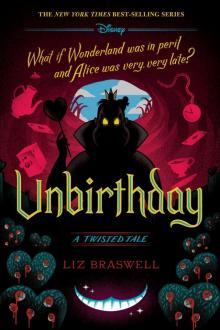 Unbirthday
Unbirthday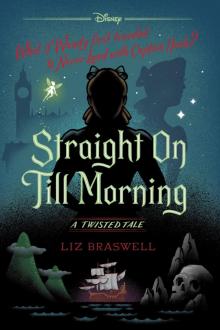 Straight On Till Morning
Straight On Till Morning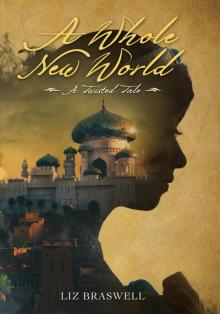 A Whole New World
A Whole New World Once Upon a Dream
Once Upon a Dream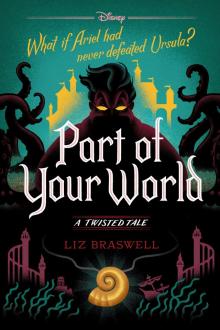 Part of Your World
Part of Your World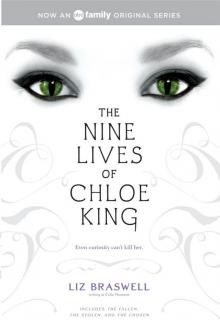 Nine Lives of Chloe King
Nine Lives of Chloe King The Fallen
The Fallen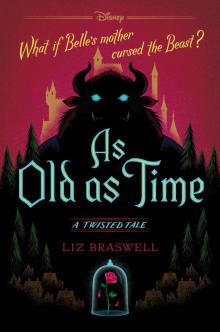 As Old As Time: A Twisted Tale (Twisted Tale, A)
As Old As Time: A Twisted Tale (Twisted Tale, A)